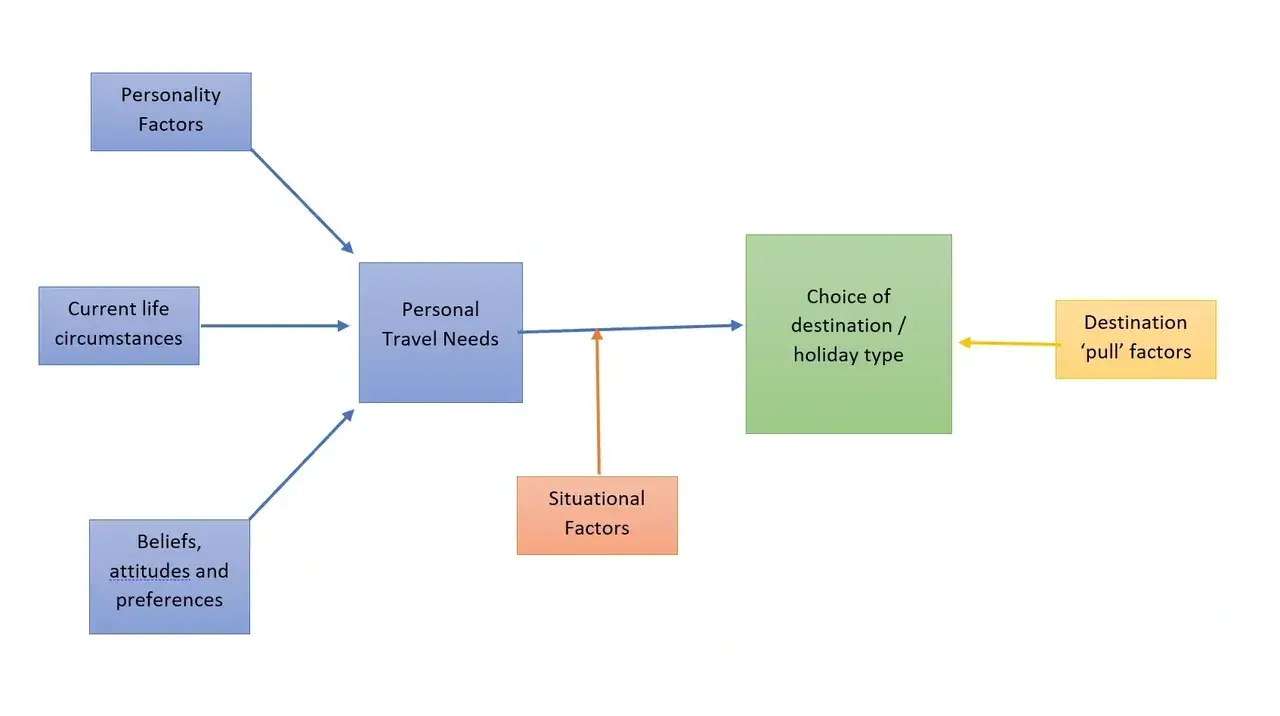Travel & Personality: An Introduction by a Clinical Psychologist

Type the word ‘personality’ into Google and you will get over 600 million hits. People love to read about personality types and to apply them to all sorts of things, from work to relationships even down to fashion and food choices. Sometimes these articles are balanced and helpful, but unfortunately this is not always the case. With this article I would like to go back to basics of personality theory and how we might apply it to travel, hopefully in a balanced and thoughtful way.
The Basics of Personality
Anyone who has ever studied psychology will be familiar with the concepts of personality and individual differences.
There is a huge amount of information available around different measures and theories of personality. Enough to make your head spin. So to boil it down, it is generally accepted that there are five personality dimensions that can be reliably assessed. These are Neuroticism, Extraversion/Introversion, Openness to new experience, Conscientiousness, and Agreeableness (Maltby et al., 2017). I’ll talk more about how some of these might be applied to travel in the next section, but first some important caveats.
What we need to remember is that we should be cautious of making sweeping generalisations based on personality types. They are certainly not the only factors that can explain our behaviour.
When we think about other people we tend to assume that their behaviour and preferences are mostly due to stable factors like personality. However when we explain our own behaviour, we place more emphasis on the situation and context. Actually the latter tends to be more accurate, and so in psychology we call this the ‘fundamental attribution error’. Our behaviour is determined in part by our personality, BUT we are often affected more by our mood, the situation, how others might be behaving and what else might be going on in our lives.
The other important caveat is that whilst personality factors are generally regarded as relatively stable, our measurement of them is not 100% reliable. This means that the same person may score differently on measures of personality across their lifetime, or even over a short period of time. This may be due to the natural ups and downs of life and that the measures themselves are not perfect . The take home message is that there are lots of limitations to the methods we use and we should always take any information about personality in the media with a pinch of salt.
Travel and Personality
So with the limitations in mind, lets look at how aspects of personality might affect our travels. I’m going to focus on Extraversion and Introversion, Openness to Experience and Conscientiousness as these are the most applicable to our travel needs and preferences.
Extraversion and Introversion
Probably the most widely understood aspect of personality. Those scoring higher on extraversion tend to enjoy interaction, are enthusiastic and action-oriented. On the other hand, introverts tend to be quieter, and more reserved and deliberate in their interactions. Introverts don’t necessarily dislike interaction but can feel drained by busy social situations and require time alone to recharge. Extraverts on the other hand tend to be energised by being with others. Knowing this can help both introverts and extraverts to think about how to make the most of their time on holiday.
Openness to Experience
Those higher on this dimension tend to seek out varied experiences and adventures. They also tend to be more curious and creative. On the other hand, those scoring low on this dimension tend to be more focused, and tend to prefer routine and convention. Its very intuitive that those who are more open to experience might tend to have more adventurous holidays and will be more likely to seek opportunities to experience new cultures, foods and activities. Those who are lower on this dimension might prefer more traditional holidays and organised tours.
Conscientiousness
People who score highly on conscientiousness tend to be hardworking, dependable and organised. When it comes to travel they are more likely to be the itinerary planners! They tend to be thoughtful and value planning in the hope to get the most out of the trip. Those lower on this dimension will tend to be more spontaneous, possibly even impulsive, and carefree. They will perhaps tend to plan less and more likely to ‘go with the flow’.
How important is personality when it comes to travel?
My opinion is that personality is a factor in our travel choices but there also are other factors that will influence what we want and need from a holiday. What these factors might be and how they might interact are shown in the diagram below. This is not a scientifically- tested model but provides an idea of the factors that might be relevant to consider when we think about travel needs and choices. Importantly it shows us that there are many relevant factors, above and beyond personality.

So what are these other factors?
Current life circumstances
As a rule an extravert will be more likely to value social interaction, but what if their life circumstances mean they have been interacting almost continuously for six months to start up a business, or to support those around them going through a difficult time? What if someone high on conscientiousness has been working flat-out and persevering to get their thesis in and to make time to charity work?
You see where I’m going here. If we are maxing out our usual strengths then we may want to do something different on our holiday! Life circumstances such as whether we are in a relationship, have children, are travelling solo or with others are all likely to have a huge bearing on what our needs might be.
Beliefs, attitudes and preferences
We all have beliefs about what an enjoyable or meaningful or valuable holiday looks like. These will have been developed through our previous experiences, our personal preferences and also from the influences of others including the media and advertising.
For example, there are lots of people who would never choose a package holiday. This may be down to personality and wanting to freedom choose each aspect of the holiday. We may also have assumptions about what a package holiday may look like or mean. For example, assuming that package holidays are mostly people sitting around the pool drinking beer every day and never venturing out of the hotel. In recent years holiday companies have cottoned on to this and have started creating and marketing different packages to meet differences preferences including luxury, wellness or food focused resorts, family or adults only destinations and party resorts etc.
Situational factors: There is a long list of factors that will influence our decisions around destination choice unrelated to our personality. These will include our budget, the time we have available, the options for getting to our destination and whether this is convenient, the preferences and needs of others you may be travelling with and even the choice of flight times. The information available on any given destination is also likely to be an important variable. Twenty years ago it might have been hard to get information on where you’re going beyond a paragraph in the brochure or by asking your Mum’s mate Tracey (which might honestly be a bad idea). Now we are on the other end of the spectrum with there being the potential for information overload.
Destination ‘pull’ factors: These are the factors that might draw you to a specific destination including sights of interest, hotels, beaches, other natural beauty spots, cultural experiences and the weather. Obviously it is helpful to get a good match between what your holiday needs might be and the characteristics of the destination you choose.
Pulling it together
In summary, whilst personality can influence what we may want and need on our holiday, there are lots of other factors that will influence our travel choices. It’s easy to see that with so many factors at play and with the mass of information to sift through, we may not always fully meet our travel hopes and expectations! I’ve written another post on how to manage this here .
References
American Psychological Association (2021) Can a personality test determine if you’re a good fit for a job? With Fred Oswald, PhD. Speaking of Psychology Podcast.
Maltby, J., Day, L. & Macaskill, A. (2017) Personality, Individual Differences and Intelligence (4th Ed). Pearson.
